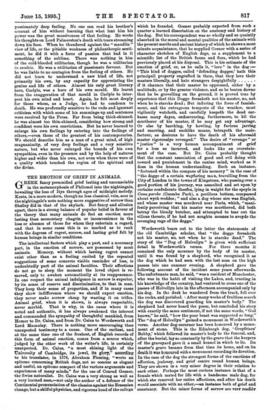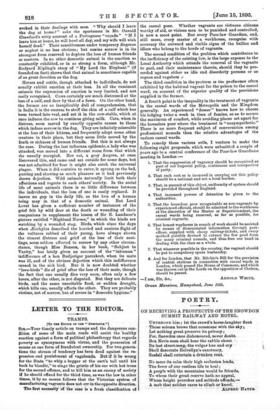THEEMOTION OF GRIEF IN ANIMALS.
GREEK fancy personified grief lasting and unconsolable in the metamorphosis of Philomel into the nightingale, bewailing the loss of Itys through ages of midnight melody. Keats, in a more modern, though no less classical, vein, sees in the nightingale's note nothing more suggestive of sorrow than Shelley did in that of the skylark. But fancy and allusion apart, there is a strong balance of popular belief in favour of the theory that many animals do feel an emotion more lasting than momentary chagrin or inconvenience in the loss or absence of those for whom they entertain a regard, and that in some cases this is so marked as to rank with the degrees of regret, sorrow, and lasting grief felt by human beings in similar conditions.
The intellectual factors which play a part, and a necessary part, in the emotion of sorrow, are possessed by most animals. Memory, without which lasting regret cannot exist other than as a feeling excited by the repeated suggestions of some concrete visible reminder of loss, is undoubtedly part of the animal faculties. Their affections do not go to sleep the moment the loved object is re- moved, only to awaken automatically at its reappearance. In one respect the animal indulgence in sorrow is superior, by its sense of reserve and discrimination, to that in man. They keep their sense of proportion, and if in many cases they show indifference where we should expect emotion, they never make sorrow cheap by wasting it on trifles. Animal grief, when it is shown, is always respectable, never morbid. That is why, in the cases where it is noted and authentic, it has always awakened the interest and commanded the sympathy of thoughtful mankind, from Homer to Dr. Caine, and from Dr. Gains to Wordsworth and Lord Macaulay. There is nothing more encouraging than unexpected testimony to a cause. One of the earliest, and at the same time one of the freshest, of English records of this form of animal emotion, comes from a source which, judged by the other work of the writer's life, is certainly unexpected. Dr. Caine, "a most shining light of the University of Cambridge, its jewel, its glory," according to his translator, in 1576, Abraham Fleming, " wrote an epitome concerning British dogs, not so concise as elegant and useful, an epitome compact of the various arguments and experiences of many minds," for the use of Conrad Gesner, the Swiss naturalist. Dr. Caius was a very strong as well as a very learned man,—not only the author of a defence of the Continental pronunciation of the classics against the Erasmian change,'but a skilful physician, and rigorous head of the college which he founded. Gesner probably expected from such a quarter a learned dissertation on the anatomy and history of the dog. Bnt his correspondent was so wholly and so quaintly absorbed in the moral and mental qualities of the animals with the present merits and ancient history of which he shows a most minute acquaintance, that be supplied Gesner with a series of character sketches of English dogs, as a supplement to a scientific list of the British fauna and flora, which he had previously placed at his disposal. This is his estimate of the emotion of grief, or, as he calls it, " love " in the dog :— " This kind of dogges, called 'defending dogges,' hath this principall property engrafted in them, that they love their
masters liberally, and hate strangers despightfally if it chaunce that their master be oppressed, either by a multitude, or by the greater violence, and so be beaten downe that he be grovelling on the ground, it is proved true by experience that this Dogge forsaketh not his master, no, not when he is starcke dead ; Bat induring the force of famish- ment, and the outrageous tempests of the weather, most vigilantly watcheth, and carefully keepeth the dead car- kasse many dayes, endeavouring, furthermore, to kil the murtherer of his master, if he may get any advantage. Or else by barcking, by howling, by furious jarring and snarring, and suchlike means, betrayeth the male- factour, as desirous to have the death of his aforesaid master rigoroaalye revenged." The desire of " revenge " or " justice " is a very human accompaniment of grief for a loss so incurred, and looks like an overstate- ment of the case. But Dr. Gains probably thought that the constant association of good and evil doing with reward and punishment in the canine mind, worked as it does in the human understanding. Such an instance, " fortuned within the compass of his memory" in the case of "the dogge of a certain wayfaring man, travelling from the City of London to the towne of Kingstone, who passing over a good portion of his journey, was assaulted and set upon by certaine confederate theefes, lying in waight for the epoyle in Come parcke (Coombe Park), a perillous bottom, compassed about wyth woddes ; " and also a dog whose sire was English, and whose master was murdered near Paris, which, "mani- festly perceiving that his master was murthered, did both betray the bloudy butcher, and attempted to tear out the villons throate, if he had not soughte meaner to avoyde the revenging rage of the dogge."
Wordsworth bears out to the letter the statements of the old Cambridge scholar, that " the dogge forsaketh not his master, no, not when he is starcke dead." The story of the " Dog of Helvellyn " is given with sufficient detail in Wordsworth's verses. For three months it remained the only mourner by the body of its master, until it was found by a shepherd, who recognised it as the dog which he had seen with the lost man on the high passes late one summer evening. A shepherd gave the following account of the incident some years afterwards. The unfortunate man, he said, " was a resident of Manchester, who was in the habit of visiting the Lakes, and, trusting in his knowledge of the country, had ventured to cross one of the passes of Helvellyn late in the afternoon accompanied only by his dog. In the dusk he wandered from the track, fell over the rocks, and perished. - After many weeks of fruitless search the dog was discovered guarding his master's body." The shepherd had never heard the poem, but concluded his story with exactly the same sentiment, if not the same words, " God knows," he said, "how the poor beast was supported so long." The "dog of Helvellyn" gained a monument in Wordsworth's verse. Another dog-mourner has been honoured by a monu- ment of stone. This is the Edinburgh dog, Greyfriars' Bobby,' which followed its master's body to the funeral, and, after the burial, lay so constantly by the grave that the keepers of the graveyard gave it a small kennel in which to lie. Its master's grave became from that time its home, and on its death it was honoured with a monument recording its devotion. In the case of the dog the strongest forms of the emotions of affection, jealousy, and grief centre round human beings. They are shown in a very minor degree in their relation to each other. Perhaps the most curious instance is that of a female which mated for life with a handsome male dog, for which she reserved her entire affections, and after his death would associate with no other,—an instance both of grief and constancy. Bat the minor forms of sorrow are very readily evoked in their dealings with men. " Why should I leave the dog at home ? " asks the sportsman in Mr. Oswald Orawfurd's witty account of a Portuguese " cacada." "If I leave him at borne, he will howl all day, and my wife will wish herself dead." Their sensitiveness under temporary disgrace or neglect is no less obvious ; but canine sorrow is in its strongest form reserved to deplore the loss of human friends or masters. In no other domestic animal is the emotion so constantly exhibited, or in so strong a form, although Mr. Rudyard Kipling's story of " My Lord the Elephant" (if founded on fact) shows that that animal is sometimes capable of as great devotion as the dog.
Horses and cattle, though attached to individuals, do not usually exhibit emotion at their loss. In all the ruminant animals the expression of emotion is very limited, and not easily recognised. Cows certainly are much distressed at the toss of a calf, and deer by that of a fawn. On the other hand, the former are so inexplicably dull of comprehension, that in India it is the custom to stuff the skin of a calf which has been turned into veal, and set it in the cow•stable, which at once induces the cow to continue giving milk. Cats, when in distress, seem moved by exactly opposite causes to those which induce sorrow in the dog. They are infinitely miserable at the loss of their kittens, and frequently adopt some other 3reature in their place, but they seem little moved by the death or sickness of human friends. But this is not always the case. Daring the last influenza epidemic, a lady who was attacked, was moved into a different room from that which she usually occupied. Her cat, a grey Angora, at once discovered this, and came and sat outside for some days, but was not admitted for fear it might also catch the universal plague. When it did contrive to enter, it sprang on the bed, purring and showing as much pleasure as it had previously shown dejection. Wild animals naturally limit both their affections and regrets to each others' society. In the social life of most animals there is so little difference between the individuals, that the loss of one is easily replaced. It leaves no gap in the daily life, as the loss of a human being may in that of a domestic animal. But Lord Lovat has given a sufficient number of instances of the grief felt by wild deer at the death or wounding of their companions to supplement the lesson of Sir E. Landseer's picture entitled "Highland Nurses," in which the hinds are watching by a wounded stag. Birds, which since the days when 2Eschylas described the hurried and anxious flight of the vultures robbed of their young, have always shown the utmost distress and grief at the loss of their nest- lings, seem seldom affected to sorrow by any other circum- stance, though Miss Benson, in her book, "Subject to Vanity," has lately given an account of the " inhuman " indifference of a hen Budjerigar parrakeet, when its mate was ill, and of the obvious dejection which this indifference caused in the sick bird. Bat it is now doubted whether "love-birds" die of grief after the loss of their mate, though the fact that one usually dies very soon, often only a few hours, after the other, is not disputed. But they are delicate birds, and the same unsuitable food, or sudden draught, which kills one, usually affects the other. They are probably victims, not of sorrow, but of errors in " domestic hygiene."



































 Previous page
Previous page